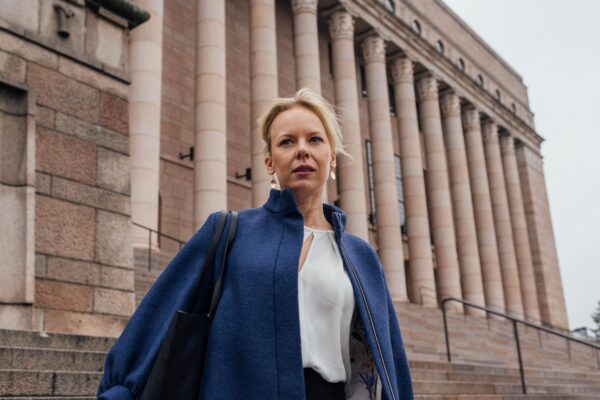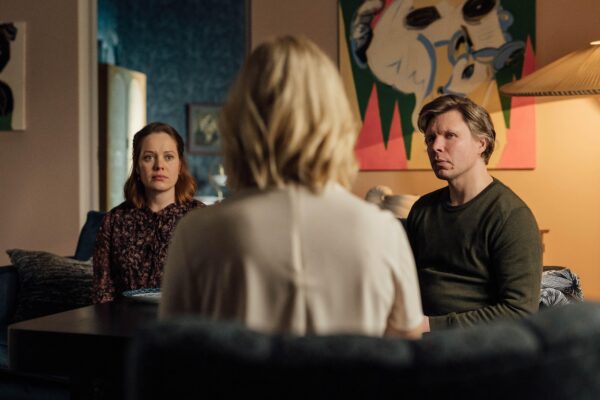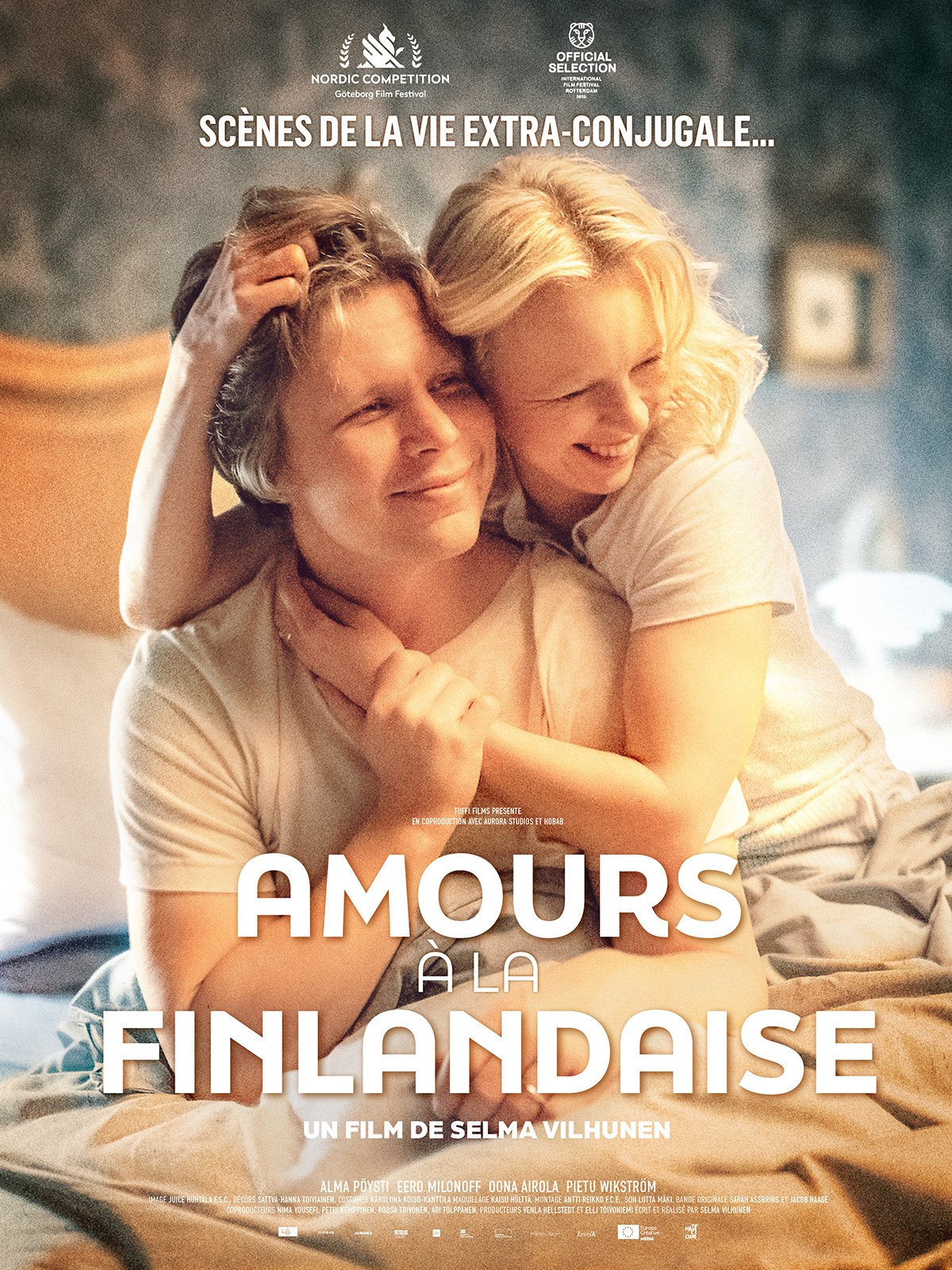‘Four Little Adults’ tackles the topic of love in its many forms. It tells the story of Juulia (Alma Pöysti), who finds out that her husband Matias (Eero Milonoff) is having an affair with another woman after which she decides to turn her marriage into a polyamorous relationship. We had the chance to sit down with the film’s director and screenwriter Selma Vilhunen and actress Alma Pöysti in Paris to discuss the film.
Alma and Selma, could you tell us what we can expect from the film?
Selma: I wanted to approach the question of what love is as thoroughly as I could. I found the perspective of polyamory to be a fruitful way to explore all that is involved in love, for example, what kind of power structures. From the film, one can expect a journey through the questions of love. And perhaps, I would hope that it could be an experience of love for the viewers.
Alma: I see it as an opportunity to start thinking about the ways we experience love or what we think a relationship is. We can get some new insights and it might disrupt our habits in a good way. This film also has a rather compassionate view on people, which can feel good.
In the film we see, for example, Eero Milonoff as a priest called Matias. We are in an urban city environment in Helsinki, among middle-aged and middle-class people. Selma, what made you approach polyamory through these characters and environment?
I wanted to go on a journey with people for whom polyamory was not so easy. Throughout the film, the characters are confronted with the norms that have been embedded in their heads in different ways throughout their lives. They have to ask themselves where these norms come from and whether they genuinely want them in their lives. And I am not saying that there is not any good in these norms, but I think it is good to look at them a little and ask why something is taboo, forbidden or even considered a sin.
I have always found it interesting that loving is often considered worse than violent, abusive behaviour. Why is it so scary when someone loves freely? These are the kinds of things you can get a glimpse of through the lives of Matias and Juulia.
Alma, you are playing Juulia, who is a member of parliament for the Equality Party. Could you tell us more about your character?
Juulia is a truly inspiring person. She is also rather progressive in her politics. In her work, she constantly wants to build a better world for others. Through this relationship crisis, she is also trying to think about how to solve the situation so that as many people as possible can live happily. Juulia wants to be a better person, and while that proves difficult, I find that effort admirable and inspiring. Juulia also grows as a person during the film. She gains self-confidence, realises and faces a lot of new things, and also, gets a lot of good in her life.
Selma, was there any real life inspiration behind the character of Juulia?
No one in particular. Her profession was the one important thing I wanted for her character. Juulia holds a public office in which she is trying to build a better world – at least in her own mind – and she has power. These were things that seemed important from the very beginning. So, there may be role models, but no one explicitly.

Alma, love is also a central theme in your role in Aki Kaurismäki’s Fallen Leaves. How can love be played and how can you prepare for it? What role do your co-actors have in enabling you to convey such emotions?
You just have to love. Which in both these cases was not difficult at all! Love is multifaceted, it can look like Kaurismäki or like Vilhunen. But of course, it’s all about who you’re with. The answer is always in the other person and what happens between us is the interesting thing. You just have to be really open, sensitive and sometimes brave to be able to be with someone without hiding behind a mask. With Eero, we had a great and long process of building a 20-year marriage in a convincing way. The kind of everyday way of being together, from the tone of voice to small gestures.
The dynamics of the group were also amazing. For example, the coffee scene with Enni and Matias. It was a lot of fun to act with actors like Eero and Oona. It was a day of celebration to get to do that scene. We were all so emotional, it felt fun and sad at the same time. It was like everyone had their own roller coaster ride, and there were all these emotions mixing.
In addition, it was very helpful that Marja-Riitta Mäkelä was one of our intimate coordinators on this project, with whom we had a truly wonderful rehearsal method. We got to explore and it was relaxed, and it didn’t feel like we had to succeed all the time. That’s what makes it compelling. And it’s great to work with Selma because she cares about the actors and the community. The idea that the sum is greater than its parts. It’s a very generous and courageous way to work.
Selma, about your direction style. How much room do you leave for intuition and improvisation when shooting?
Selma: The script provides a clear framework for the scene so improvisation doesn’t take it to a completely different direction. In that way, the script provides the framework, but the actors have a lot of freedom within it. One of the most important tasks of a director is probably to see what is happening in the shot and to then recognise if what the actors are offering belongs to the film. Some intuition or understanding of that scene I’ve written tells me that it needs to settle more in that direction than this. It’s a kind of gentle nudging, because it’s also important that the scenes come to life naturally. Often, with their own intuition, actors bring things into the scenes that I could not have imagined myself. And there’s no point in micromanaging the scenes. It’s a kind of dance of gentle nudging and receiving.
Alma: And Selma, you are one of those rare people who can create a fluid atmosphere on set. So, if it seems we are going in the wrong direction, it’s not a mistake. Creating an atmosphere is such a delicate and important thing.
Selma: I’m inspired by that kind of free-fall feeling. That’s why I dare to let go sometimes. For example, that particular coffee scene between Matias, Enni and Juulia. It was a celebration for me too, when the actors came up with that wonderful treat. I thought it was kind of weird and just laughed. Then I thought that I just had to let them do their thing.
Alma: It was something like jazz.
Selma: Yeah exactly, it was some kind of free jazz! It was also a great relief for me, that I felt that all four actors were making the same film with me pretty much from the beginning. They just somehow understood the different nuances intersecting in the script.

Moving on to the reception and distribution of the film. Finnish films are popular in France. Alma, you have starred in several of these successes. What do you both think is behind the success of Finnish films in France?
Selma: Alma Pöysti! (laughter)
Alma: They dare to be original, maybe that’s the reason. They have a look of their own. They don’t go with the trends. That’s probably what appeals to and fascinates people outside of Finland as well.
Selma: I would say the same thing. Finnish filmmakers have the freedom to make films that boldly explore the medium. They make films that look just like them and take risks. So, they make films without huge profit expectations, by putting the art of filmmaking first. It bears fruit and can also bring in audiences. And I believe that for a small country like Finland, it is the only way. We do not have the resources to make the kind of calculated spectacles that are possible in Hollywood, which bring in a lot of viewers just because there is some eye candy, et cetera in the film.
Alma: And what’s great nowadays, although I love Aki Kaurismäki’s films, is that they’re not just his films. Today Finnish films are diverse. And, yes, there’s still work to do in diversity, but I think we’re going in a great direction.
Selma: And also, people are now really skilled with the medium. People are bravely tackling subjects that they’re passionate about and films deal with issues that no one else has dealt with before from that particular angle. They are precise, surprising and radical.
Alma: And also weird!
The title of the film is Four Little Adults, which is translated into French as Amours à la finlandaise, meaning “Loves in the Finnish Way”. What is “Finnish” about the film?
What I’ve learned from people I know and from experts on relationships that I’ve interviewed for this film, is that in Finland the discussion about polyamory is very active compared to many other countries, such as Sweden. Apparently, Finland is some kind of pioneering country in the field of ethical multi-partner relationships. Every week you can read something in the newspaper about relationships referring to polyamory. So, maybe the title is not completely wrong in that sense. I believe that one reason for this is that, although a variety of problems remain, gender equality has progressed in many ways in Finland.
Alma: Nothing to add. I was also thinking about equality.
Four Little Adults will hit the big screens in France on 4 January 2024.
Text by Saara Lehtonen
